Dead by Sunset Read online
Page 7
Gini Burton, the surgical technician who was Sara’s friend and one of the guests on the blind-date evening when she first met Brad, had stopped by the ER to check on him. “Anything I can do to help, I will,” she told Sara.
“Could we stay at your house tonight?” Sara asked.
“Sure, we’ll make room. Come on over.” Gini was too tactful to ask why they couldn’t stay in Brad’s apartment or even in Sara’s. If Sara asked, she must have a good reason.
She did—Brad’s conviction that they had to keep moving, that they must never stay more than a night in one place.
Sara was certain that, underneath, Brad had to feel some sadness and regret about Cheryl’s death, even though he had been so angry at her. Those emotions had probably contributed to the arrhythmia that brought him into the ER. When a person dies suddenly, leaving so many loose ends, so many quarrels unresolved, the one left living almost always feels guilty.
Sara felt sadness and regret too. It would have been better for their sons if Cheryl and Brad had had a civil relationship. It would have been better if Brad and Sara had been able to find a common meeting ground with Cheryl so they could all work for the boys’ best interests. But now Cheryl was no longer in the picture. Sara wished she had known her; maybe if she had, she would be able to understand why someone had wanted her dead.
Brad knew why, and Sara sensed that he was trying to protect her from awful truths, things about Cheryl he had never told her. That was like him; he was strong but he was so gentle with her and the boys. No matter what the police might think, Brad was not a killer. There was no violence in him, of that she was certain, just as certain as she was that she had never loved anyone the way she loved him.
Yet Brad was afraid that he—that they—might be murdered, too. That he should be frightened of anyone or anything was the most inexplicable reaction Sara could ever have imagined. But she trusted his instincts, and she would follow his lead. Somehow, he was going to bring them all safely through this nightmare.
7
On Tuesday night, September 23, Sara, Brad, Jess, Michael, Phillip, and Brent all stayed at Gini Burton’s two-bedroom apartment in the Mount Tabor district of Portland. Brad got to Gini’s place about four that afternoon, just as Gini was arriving home from her shift at Providence Hospital. Sara showed up a short time later in her own car. Brad seemed none the worse for his trip to the emergency room, and he didn’t complain of any more chest pains or erratic heartbeats.
Gini didn’t ask questions; they all seemed so grateful to be with her in an “anonymous” location. It took some figuring to find a spot for everyone to sleep, but Gini made a bed for Jess and Michael on the couch, Phillip slept with Sara and Brad in one bedroom, and Brent slept in a sleeping bag on the living-room floor. Gini and her fiancé slept in the other bedroom.
Gini could see that Brad was nervous. “He seemed bothered, preoccupied,” she would recall. “He was concerned that someone might take his children away.”
The OSP detectives were concerned with finding the person who had killed Cheryl. In September of 1986, Lieutenant LeRon Howland was Superintendent of the Oregon State Police Criminal Investigation Division. He was kept updated on the Keeton homicide by Lieutenant Corky Forbes, who commanded the Beaverton office of the OSP, or by OSP Sergeant Greg Baxter, who was the hands-on supervisor of the case. Baxter had chalked up seventeen years on the force and that third week in September had been one of his busiest. With Washington County District Attorney Scott Upham and his staff, Baxter and his investigators had worked almost around the clock on the Friday night murder. Cheryl Keeton’s bizarre death had put a strain on both departments. Baxter assigned Jerry Finch and Jim Ayers to carry through as the lead detectives in the Keeton homicide. They would be the most actively involved, but Lieutenant James Boyd Reed, Les Frank, Tom Eleniewski, Robert C. Vance, and Richard McKeirnan would all participate, along with Julia Hinkley and Greg Shenkle from the Oregon State Police crime lab.
In the first week after Cheryl Keeton’s body was found on the Sunset Highway, Finch and Ayers had more than enough to do. They had already talked to Brad Cunningham, the victim’s estranged husband, long into the early hours of the morning after her death. Ayers wanted to know a lot more about Cunningham—but that wasn’t going to be easy; they couldn’t find him. He wasn’t in his apartment, and he hadn’t shown up at work at the U.S. Bank either, though he apparently hadn’t left town. Ayers and Finch had reports that Brad had been seen here, there, and everywhere. But they were always two steps behind him.
Southwest 79th Street was the likeliest place for the OSP detectives to begin their “heel-and-toeing”—canvassing the area, asking questions, handing out flyers. The person who had propelled the blue Toyota van onto the freeway could have done it only from 79th. The detectives might get lucky. People living along the street abutting the freeway might have seen that person. Or they might not. It had been almost completely dark when Randy Blighton discovered Cheryl’s body. Maybe nobody had seen anything at all.
Jack and Danielle Daniels lived at 2035 79th. Daniels had been playing golf that Sunday and had driven home a little after eight—up Canyon Drive to West Slope and then northbound on 79th. He had seen a van on the east side of the street, facing north, almost directly across from his house, near his mailbox. As he pulled into his driveway, he recalled, the van had gone forward about fifty feet. At that time, he saw two people in the front seat. And he thought he saw a child standing in the backseat. But it might have been only the outline of the child’s carseat just behind the driver.
Danielle Daniels was watching the Emmy Awards show when her husband got home. She told Jerry Finch that she had heard loud “banging” noises sometime between 8:00 and 8:40 on Sunday night. She had gone to the window to look out and asked Jack, “Did you hear something?”
“No,” he had responded. “Only the dogs barking.”
Once more, Danielle heard something and looked out. She told Finch, “A man came to our door about twenty minutes later, pounding on the door, and I called my husband.”
That, of course, was Randy Blighton frantically trying to get help for the woman he had found in the Toyota van.
Asked to describe the “banging” noises and to try to isolate the time she heard them, Danielle said, “Jack came home at 8:10. I heard the noises ten minutes later. It sounded like a rubber hammer on a car. A few minutes later, I heard the noise again. And it was fifteen or twenty minutes after that when the man came to the door looking for help for the woman.”
Michael Cacy, a freelance illustrator, lived in the 2100 block of S.W. 79th. He told state police detectives that he and his neighbors were used to seeing vehicles with lost and confused drivers on their street. “We saw a lot of freeway refugees,” he commented wryly. He tried to reconstruct in his mind the evening of September 21.
That Sunday Cacy had a “rush” project to finish, so he had worked all day in his office in Portland’s Old Town district. He went home for a quick dinner around six and then prepared to head back to his studio. “I expected that I’d have to work all night if I was going to finish.”
Cacy said he had had no particular reason to keep track of time, save for the fact that he wanted to get to Old Town in time to watch the Emmy Awards show at 8 P.M. on the television set in his studio. It was a way for him to fool himself into thinking he wasn’t really working around the clock—and on a weekend to boot.
Cacy had been a little impatient as he started back to Old Town and found his way blocked by a small late-model van that was stopped in front of him on S.W. 79th. It was right around 8 P.M.—a little before or a little after—and now he was sure he was going to miss the start of the Emmy show. Although the sun had disappeared into a purpling layer along the horizon, it was light enough for Cacy to see that the van was either a Toyota or a Dodge and probably blue or blue-gray in color.
Cacy was in a hurry and the van’s driver didn’t seem to know where he was going or have the initi
ative to get out and ask. The van was aimed at the freeway, but it wasn’t moving. A little annoyed, Cacy sighed, backed up, and pulled around. Idly his mind computed that the driver was male. “If it had been a woman, I would have stopped and offered her some assistance,” he said. It was a fleeting encounter, erased from the surface of Cacy’s consciousness almost as soon as he eased onto the Sunset Highway and merged with the steady ribbon of traffic heading for Portland.
When the news of the death on the Sunset had hit the papers, the Beaverton station of the Oregon State Police got the usual number of phone calls from people who offered tips, suggestions, and, in a few cases, sightings of “suspicious” men. Finch was hurrying out of the office when a clerk handed him a telephone message slip. He read it, he remembered the contents, but somewhere in his travels that day, he lost the slip itself. And with the slip, he lost the name and phone number of the caller—if, indeed, the caller had left either. Anonymous calls tend to be the rule rather than the exception when people call police.
The message was from a couple who had read about the Toyota van on the freeway. They happened to own an identical car, and the news coverage caught their attention. They had been driving in the West Slope area at dusk on Sunday and recalled passing a dark, muscular man, who was jogging near the freeway. It had seemed an odd place to jog. The man had something tucked under his arm as if he was carrying a football. For an instant, their headlights had picked up his face, and then they swept on by, his image as blurred as their memory of the moment.
Human memory is a fascinating and imprecise faculty. In this instance, it didn’t matter. Finch could never locate the memo or the people who had called about the man running in the West Slope area that Sunday night. If he had been Cheryl’s killer, might he not have stopped behind a bush or in the shadows, removed his outer clothing, rolled it into a ball, and then run from the scene until he found a dumpster or some other spot to throw away possibly bloodstained clothes?
It was a theory that seemed plausible. Michael Cacy had seen only one vehicle on S.W. 79th when he left home within a half hour of the discovery of the homicide on the Sunset. Unless there had been more than one killer involved, whoever had beaten Cheryl to death would have had no way to leave the area except on foot.
Joggers were everywhere; this one might have thought no one would notice him. But someone had. It was one very small chip in a very large mosaic.
The reason that investigators could not locate Brad Cunningham for further questioning in the days following Cheryl Keeton’s murder was, of course, that he was on the move constantly, taking Sara and his sons with him, running from whatever enemies and demons pursued him. Thanks to Sara’s friends and her relatives, they were welcome at a number of residences. Brad was adamant that it was far too dangerous for them to return to either of their apartments in the Madison Tower.
Brad had Phil Margolin representing him, but Margolin explained that he couldn’t represent the children too. When Brad insisted that his sons must have an attorney, Margolin suggested that he retain Susan Svetkey, a lawyer with his firm. Her practice was devoted to children’s interests—to making sure that they came before any other agendas. Sara wrote out another check, this one for Susan Svetkey. Susan never talked to Brad, nothing more than saying “hello.” She was not his lawyer.
Brad wanted his sons protected, and he didn’t want police playing with their minds—perhaps trying to force their memories into flawed recollections. He knew that the Washington County grand jury was about to meet, and two of his small sons had been subpoenaed to testify. He didn’t want anyone talking with his sons—not the police, and certainly not the grand jury. They were little boys, they had lost their mother, and, of course, they were in as much danger as he was.
Brad could not ignore the subpoenas, but at least Jess and Michael would have legal representation. Susan Svetkey was a slender, attractive woman with a warm and earnest manner. It didn’t matter who hired her; her allegiance was always to the children she represented. She was very concerned about Jess and Michael Cunningham. As a separate matter she wondered about their competency as witnesses. They were so young.
Served at the hospital, Sara responded to her own subpoena and also delivered Jess, Michael, and Brent Cunningham to the Washington County Courthouse on September 24. And shortly before the grand jury hearing into the death of Cheryl Keeton, Susan Svetkey and Jerry Finch talked with Jess and Michael in a conference room in the D.A.’s office. They needed to determine what, if anything, the boys might be able to testify to. If neither child was competent to appear before the grand jury, they needed to know that too. Grand jury hearings are cloaked in secrecy, and attorneys are not permitted to accompany their clients into those sacrosanct chambers.
At six, Jess Keeton Cunningham was an extremely bright little boy. So was Michael Keeton Cunningham, but he was only four and seemed distracted and querulous. Why wouldn’t he be? He had just lost his mother.
Finch would ask questions, while Susan Svetkey took notes. It had never even occurred to her that Brad would want his children sequestered from the detectives investigating Cheryl’s murder. As far as she knew, he had been home with the youngsters the night their mother was killed. She believed she was with his sons solely to make this process as untraumatic as possible for them.
Finch was a kind man and he began talking quietly to Jess, assuring him that he was not in trouble, not at all. Finch just needed to ask him some questions. When he asked Jess how old he was, Jess said he was six—and that his birthday was on October 25. He also said he liked sports and that he played soccer.
“Did you have a soccer game last weekend?” Finch asked.
“I don’t know the days. . . .”
Patiently, Finch drew parallel lines representing the days of the week on a piece of paper and found that Jess was perfectly able to show him which days were his school days and which were soccer days. Jess remembered that his father had picked him up from his mother’s house on Friday or Saturday (September 19 or 20) and that they had talked about his soccer game.
“What day was your soccer game?”
Jess pointed to the sixth line (Saturday). “My team was the Bridlemile Buddies and we played the Bridlemile Blazers. We won six to two!”
Jess remembered that his dad had taken him and his brothers to the doughnut shop after the soccer game. He touched the seventh line (Sunday) as the day he was supposed to go back to his mom’s house.
“Why didn’t you go back, Jess?” Finch asked.
“I don’t know.”
The day after the Saturday line, Jess said he and his dad and brothers had gone to the hospital to have pizza with Sara, and he described the pizza restaurant as being two streets away from the hospital. After they all ate together, Jess said his dad had switched cars with Sara “from the Suburban to the ‘short white car’ because Dad’s car wasn’t running right.”
“Do you remember what you did next?” Finch asked.
According to Jess’s memory, they had gone back to his father’s apartment in the Madison Tower, and they had a sandwich and some popcorn while they watched a movie on the VCR.
“What was the movie?” Finch asked. “Do you remember?”
Jess nodded. “It was The Sword in the Stone. There was this boy and this magician—Merlin—and they tried to pull the sword from the stone, and whoever pulled it out would become the king of England. Arthur did. Once you did,” Jess confided, “you always could.”
“Where was your dad?” Finch asked.
Jess said that his dad had gone jogging with Michael while he and Phillip stayed in the apartment and continued to watch the movie. When Finch asked him if he remembered what part of the movie was showing when Brad and Michael left, Jess nodded. “Merlin and Arthur turned into squirrels and climbed up a tree.”
“When did your dad come home?”
“After it was over.”
“How did you know it was after the movie was over?”
Je
ss said the screen had gotten all “fizzed up” and he didn’t know how to rewind the tape, so he had just turned the power off. He thought maybe his father had gotten home two or three minutes after the end, but he wasn’t sure.
Jess thought for a moment and then remembered that he had left his father’s room where he had been watching The Sword in the Stone and had gone to his own room where he had a television set too. Rambo was playing on one of the local channels and he started watching that movie.
“Your dad came home sometime after you started watching Rambo?” Finch asked.
“Yeah. When Rambo was captured by the bad guys and General War Hawk took Rambo into a little cabin.”
Jess had a remarkable memory. He also remembered that when his dad came back from “jogging” he was wearing an orange and yellow “hunter’s vest.”
“Did you see your father coming through the door?” Finch asked.
“No, he came through the elevator.”
“What did your dad do after he got home?”
“It sounded like he was washing the dishes. I heard water running in the kitchen.”
Jess remembered that Michael had left with his dad, but he couldn’t recall seeing Michael come back the first time Brad returned to the apartment. He thought his dad had left again and gone to his car to get Michael.
He didn’t know what his father had been wearing when he left to go jogging that Sunday night: “I didn’t see him when he left.” But he remembered that he and both his brothers had slept on the floor of their father’s bedroom that night.
Susan Svetkey took twelve pages of notes on Jess’s memories of the night his mother was murdered. She took only two on Michael’s recall. Michael didn’t want to talk about anything, especially the night his mother died. He crawled under the big oak table in the conference room, and he whimpered and turned away when Finch tried to talk to him. It was obvious that Michael was essentially ineffective as a witness. If he remembered anything about the time when he and his father left the Madison Tower apartment on Sunday evening, he didn’t want to answer questions about it.

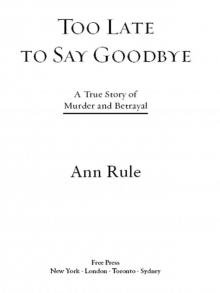 Too Late to Say Goodbye: A True Story of Murder and Betrayal
Too Late to Say Goodbye: A True Story of Murder and Betrayal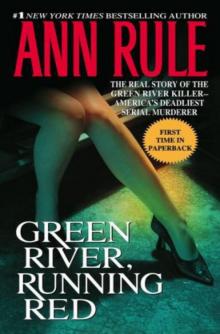 Green River, Running Red
Green River, Running Red Bitter Harvest
Bitter Harvest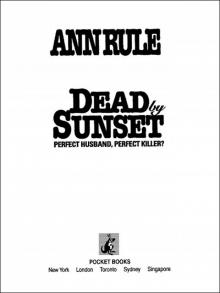 Dead by Sunset: Perfect Husband, Perfect Killer?
Dead by Sunset: Perfect Husband, Perfect Killer?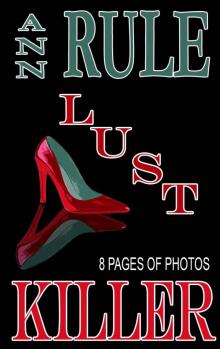 Lust Killer
Lust Killer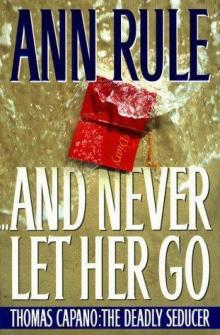 And Never Let Her Go: Thomas Capano: The Deadly Seducer
And Never Let Her Go: Thomas Capano: The Deadly Seducer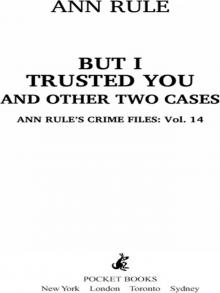 But I Trusted You and Other True Cases
But I Trusted You and Other True Cases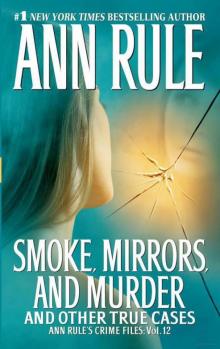 Smoke, Mirrors, and Murder and Other True Cases
Smoke, Mirrors, and Murder and Other True Cases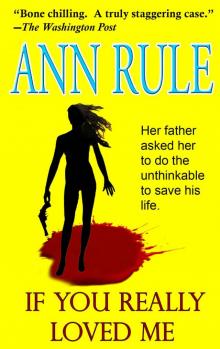 If You Really Loved Me
If You Really Loved Me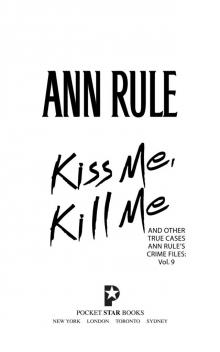 Kiss Me, Kill Me and Other True Cases
Kiss Me, Kill Me and Other True Cases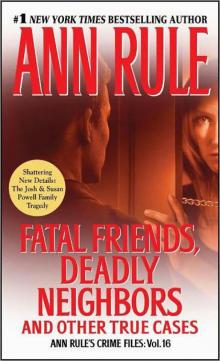 Fatal Friends, Deadly Neighbors and Other True Cases
Fatal Friends, Deadly Neighbors and Other True Cases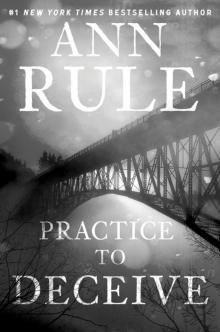 Practice to Deceive
Practice to Deceive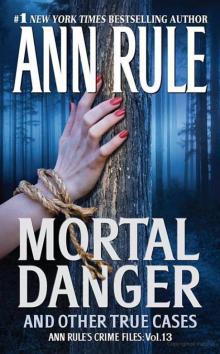 Mortal Danger and Other True Cases
Mortal Danger and Other True Cases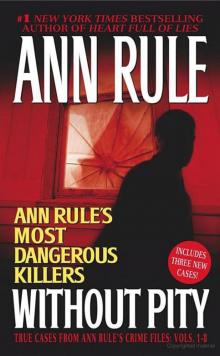 Without Pity: Ann Rule's Most Dangerous Killers
Without Pity: Ann Rule's Most Dangerous Killers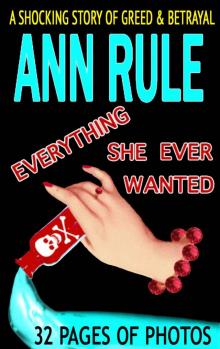 Everything She Ever Wanted
Everything She Ever Wanted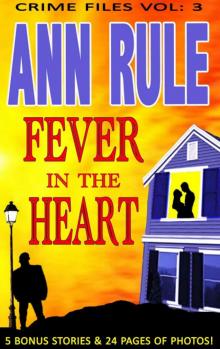 A Fever in the Heart and Other True Cases
A Fever in the Heart and Other True Cases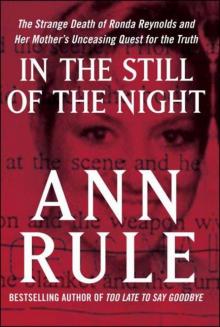 In the Still of the Night
In the Still of the Night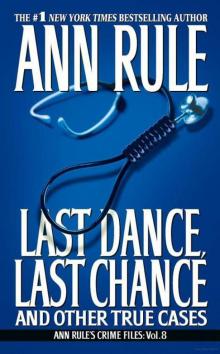 LAST DANCE, LAST CHANCE - and Other True Cases
LAST DANCE, LAST CHANCE - and Other True Cases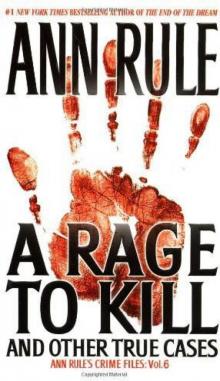 A Rage to Kill
A Rage to Kill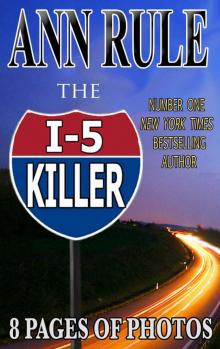 The I-5 Killer
The I-5 Killer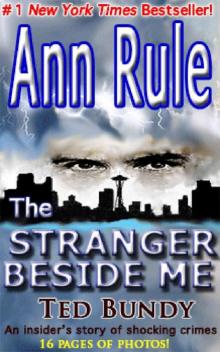 The Stranger Beside Me
The Stranger Beside Me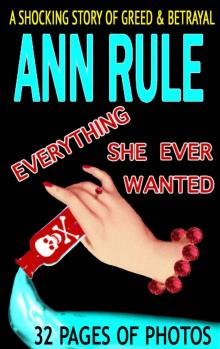 Everything She Ever Wanted: A True Story of Obsessive Love, Murder, and Betrayal
Everything She Ever Wanted: A True Story of Obsessive Love, Murder, and Betrayal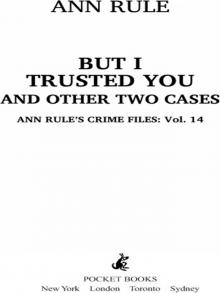 But I Trusted You
But I Trusted You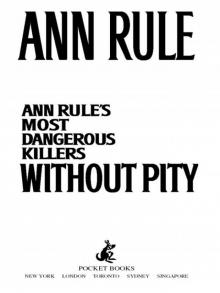 Without Pity
Without Pity Kiss Me, Kill Me
Kiss Me, Kill Me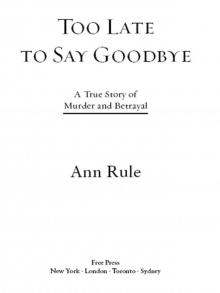 Too Late to Say Goodbye
Too Late to Say Goodbye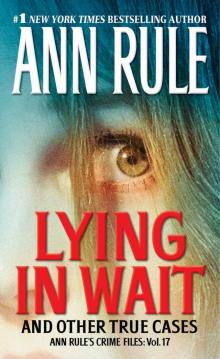 Lying in Wait
Lying in Wait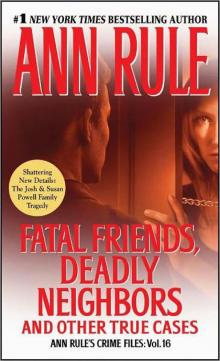 Fatal Friends, Deadly Neighbors
Fatal Friends, Deadly Neighbors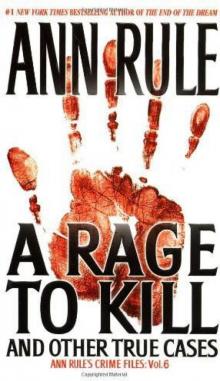 A Rage to Kill: And Other True Cases
A Rage to Kill: And Other True Cases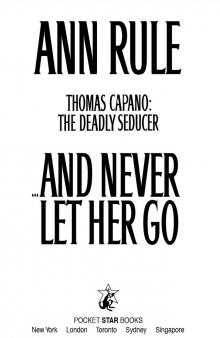 And Never Let Her Go
And Never Let Her Go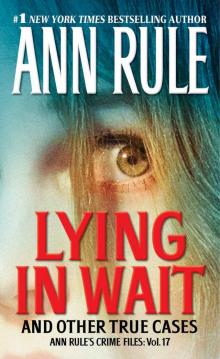 Lying in Wait Ann Rule's Crime Files Vol.17
Lying in Wait Ann Rule's Crime Files Vol.17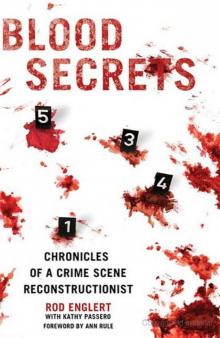 Blood Secrets: Chronicles of a Crime Scene Reconstructionist
Blood Secrets: Chronicles of a Crime Scene Reconstructionist No Regrets
No Regrets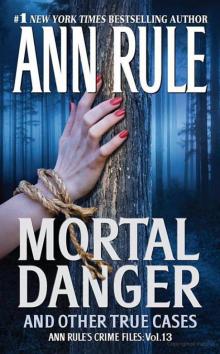 Mortal Danger
Mortal Danger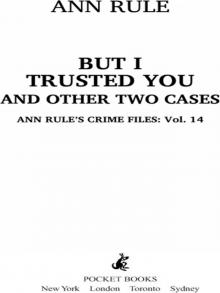 But I Trusted You: Ann Rule's Crime Files #14
But I Trusted You: Ann Rule's Crime Files #14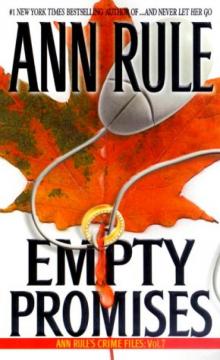 Empty Promises
Empty Promises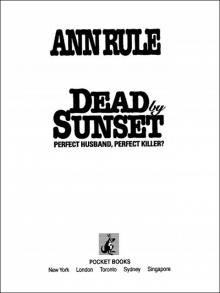 Dead by Sunset
Dead by Sunset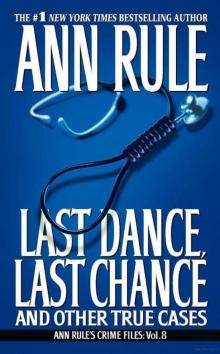 Last Dance, Last Chance
Last Dance, Last Chance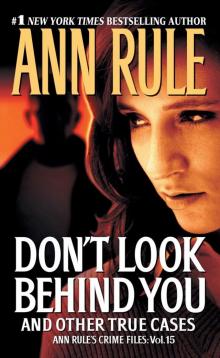 Don't Look Behind You
Don't Look Behind You